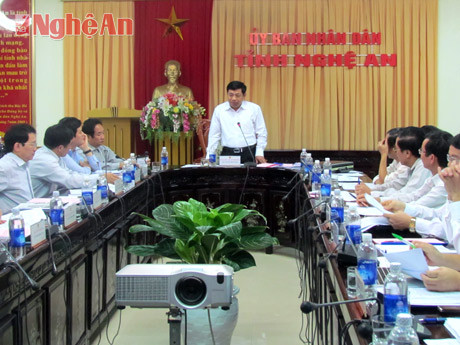Developing plants and animals associated with land management and use in the West
(Baonghean.vn) - On the afternoon of October 24, under the chairmanship of comrade Nguyen Xuan Duong - Deputy Secretary of the Provincial Party Committee, Chairman of the Provincial People's Committee, the Provincial People's Committee continued its regular October meeting to listen to and give opinions on the project to develop plants and animals mainly in the western region of Nghe An until 2020.
In recent years, the socio-economic situation of the Western Nghe An region has had positive changes. The economic structure has shifted in the right direction, the growth rate is quite high, gradually shifting from self-sufficient agricultural production to commodity production, rapidly increasing agricultural output, increasing farmers' income; forming concentrated raw material production areas associated with processing industry such as: tea, rubber, sugarcane, cassava, peanuts, paper raw materials, large livestock farming, milk processing... especially including many projects using high technology in production such as: Industrial-scale concentrated dairy farming project, greenhouse vegetable and flower growing project... However, the productivity and quality of crops and livestock in the Western region are still low, the arrangement of crop and livestock structure is not reasonable, production efficiency is not high, the potential of land, labor and existing technical facilities in the region has not been fully exploited.
Therefore, investing in developing agriculture in the West in a modern and comprehensive direction is necessary to effectively implement the Resolution of the 17th Congress of the Nghe An Provincial Party Committee on socio-economic development for the 2010-2015 term and Resolution 26-NQ/TW dated July 30, 2013 of the Politburo on the direction and tasks of developing Nghe An province until 2020. Building a project to develop the main crops and livestock of the West until 2012 is necessary to concretize the objectives set out in the resolution.
 |
Meeting scene
Chairman of the Provincial People's Committee Nguyen Xuan Duong assessed that this is an important project, which has been elaborately built, but has not yet clearly highlighted the core purpose of developing seedlings associated with land management and use in the Western Nghe An region. He requested the Department of Agriculture and Rural Development, based on comments from departments and branches, to organize a workshop to consult with agricultural experts to focus their intelligence and efforts on supplementing, adjusting and perfecting before submitting to the Provincial Party Committee Standing Committee for approval. In particular, it is necessary to clearly identify which trees and animals are associated with which areas and from the planned seedlings, determine how to build a management model, how to call for investment promotion?….
Also in this afternoon's meeting, the Provincial People's Committee listened to and commented on the implementation results of Resolution No. 02-NQ/TU dated February 22, 2011; Resolution No. 08-NQ/TU dated March 13, 2012 of the Provincial Party Committee on developing and improving the quality of human resources in the 2011-2020 period.
The program to develop and improve the quality of human resources in Nghe An province in the period of 2011-2020 was concretized by 5 projects (Planning for human resource development; training of businessmen in Nghe An province; developing civil servants and public employees; training technical workers; Planning for education and training development in Nghe An province in the period of 2012-2020) which were basically implemented on schedule, initially creating positive changes.
After listening to comments from departments, branches and sectors, comrade Nguyen Xuan Duong requested the Department of Home Affairs to synthesize, supplement and complete a general report, with a comprehensive overview of the implementation of the two resolutions of the Provincial Party Executive Committee; the initial results of implementing the contents of the resolutions associated with the projects after nearly 2 years of implementation; clarifying the shortcomings, limitations and upcoming directions and tasks. In particular, attention should be paid to the management and training of human resources, specific solutions to focus on overcoming some shortcomings, proposals and recommendations related to mechanisms and budget sources, and detailed appendices attached.
Khanh Ly






